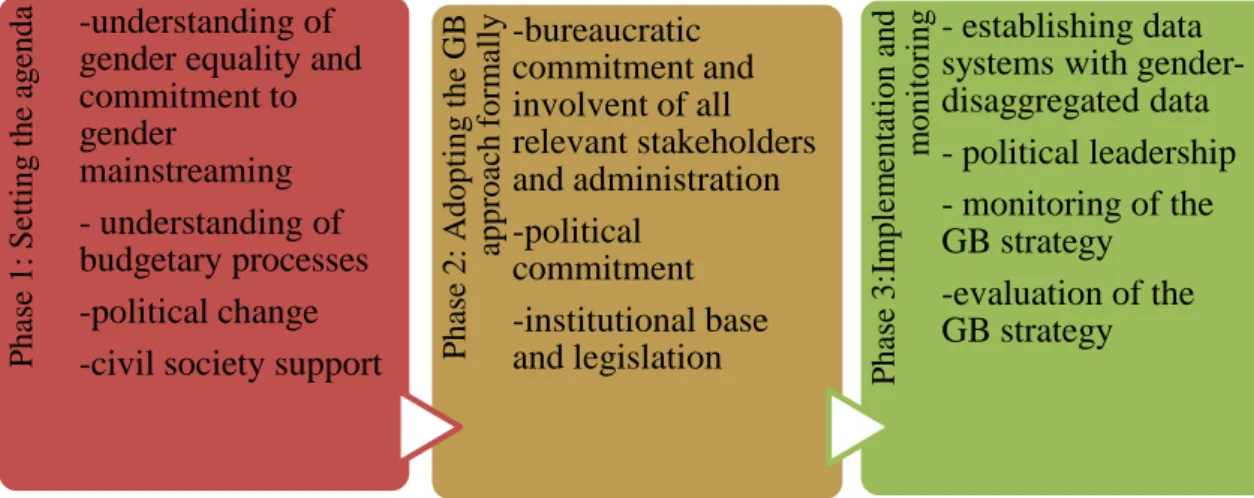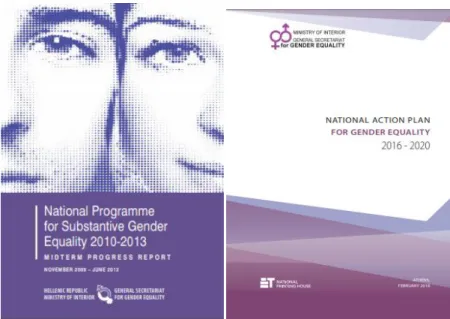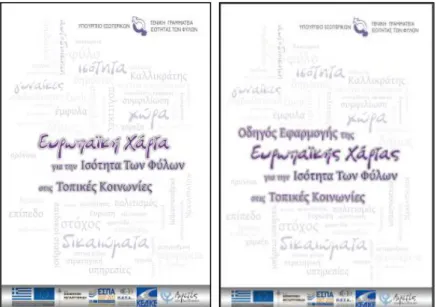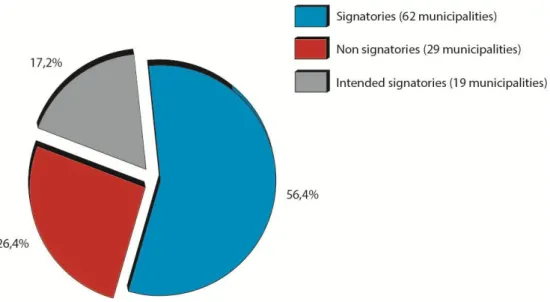Secondly, my thanks go to my colleagues at the General Secretariat for Gender Equality and the four people who were interviewed for the purpose of this Dissertation for providing the data necessary to complete my research on gender budget approach in Greek Local Government . Gender budgeting or gender-responsive budgeting (GB or GRB) is a tool to achieve gender equality by focusing on how public resources are collected and spent.
Introduction
- Background of the study and statement of the problem
- Research objective and research questions
- Methodological approach and limitations of the study
- Dissertation layout
Still another 34% may show a trend in the implementation of gender equality policies or a GB approach and is within the scope of the present study. There is a general legal framework for promoting the principle of gender equality in municipalities, but for issues of gender budgeting.
International literature review
- The concept of Gender Mainstreaming
- The concept of Gender Budgeting
- Making the case for Gender Budgeting
- Gender Budgeting approaches and methods
- Country case studies on Gender Budgeting practices
Similarly, gender equality is reflected in the Charter of Fundamental Rights of the European Union in Article 23 (European Union, 2012). Gender budgeting focuses on gender analysis and assessment of resource allocation based on gender equality criteria.

Gender mainstreaming and budgeting in the Greek Local Government. National policies
Gender equality and mainstreaming in Greece
- Legal framework
- The innovative Law 4604/2019 on Substantive Gender Equality and Preventing
- Central Government Mechanism on Gender Equality
- Local Government mechanism on Gender Equality
- Are we there yet?
At the central level, the national mechanism includes the General Secretariat for Gender Equality (GSGE), the Research Center for Gender Equality (KETHI), the Department for Gender Equality that some Ministries and the Equal Treatment Department of the Ombudsman. In fact, the powers of the Municipal Committees for Gender Equality are described for the first time in a legislative text (section 6) and are now made mandatory for. Law 4604/2019 also provides for the possibility of establishing an Independent Office for Gender Equality in the Central Union of Municipalities of Greece (KEDE)8, with the main responsibilities of providing information on gender equality issues, together with municipalities on local gender equality policies and cooperation with locally elected and candidate women for the development of networks in order to promote a more active participation of women in local decision-making (section 8).
In 2013, the European Institute for Gender Equality (EIGE)9 launched a very important assessment tool for monitoring the progress of gender equality policies among EU member states. In 2015, reference year of the current Gender Equality Index, the percentage of women members of parliament was increased to 21%.

Gender budgeting policies and initiatives in the Greek local government
- The European Charter for Gender Equality in Local Life and its implementation
- Development of Methodologies and Tools for Monitoring and Evaluating the
- Gender Mainstreaming in Greek Municipalities Focusing on Socially
- The new approved EU-funded Project “Strengthening the Executive Function of
The aim of the project was the development and pilot implementation of Gender Equality Action Plans in all regions and in the fifteen (15) larger municipalities in Greece (Athens, Piraeus, Acharnes, Peristeri, Nikaia, Larissa, Volos, Chalkida, Ioannina, Patra, Kerkyra, Rhodes, Thessaloniki, Herakleion Crete. Chania). Upgrading the expertise of Municipalities for the design and implementation of policies and programs aimed at the groups of women outlined above and raising awareness of the importance of gender integration in the design, implementation, monitoring, evaluation and redesign of local policies. Utilization of the above manuals/guides and tools that can serve as pilots or practical examples for the implementation of gender mainstreaming methods in local policies and budgets and their adoption on a larger scale.
Together with the instruments of the European Charter for Equality of Women and Men in Local Life, there is a good opportunity for municipalities to develop appropriate mechanisms for gender equality and above all for comprehensive action plans for gender equality. After a period of inactivity in the field of promoting gender equality in local government, but with the effort to increase the number of municipalities that sign the European Charter for Equality between women and men in local life, a new Program approved and implemented by the GSGE through EU funding14.

A quantitative approach on Greek municipalities and their awareness to gender equality
Introduction
Methodology
On the other hand, the most well-known disadvantage of the method is the fact that the primary data is collected for a different, very specific purpose that may be very different or unrelated to the new research questions (Bryman, 2004). In this dissertation, the researcher attempted to carefully evaluate and examine the primary data and match it with the new research questions to avoid most of the pitfalls in secondary data analysis: She was given full access to the raw data from the primary study of the General Secretariat. for gender equality, as well as any other data or supporting data. 15 Details about the two projects, the launch of the European Charter and the project “Development of methodologies and tools for monitoring and evaluating the integration of gender equality in all public policies” are presented in Chapter 3.
The fact that the primary researchers were her colleagues facilitated the process of consulting and determining the relevance of the data with the present study, the method data were collected and who was responsible for the collection and of course the relevance of the primary data with the new research question of gender budgeting in Greek local government. The purpose of the initial data collection was to conduct a survey of the progress of gender equality policies in Greek municipalities and their correlation with the National Action Plan for Gender Equality 2016-2020.
Presentation of data analysis
- The European Charter for equality between women and men in local life and
By the end of 2017, the reference year for the GSGE report on the progress of gender equality policies in Greece, almost 2/3 of the total number of Greek municipalities had signed the European Charter for Equality in Local Life. The vast majority of municipalities that participated in the GSGE pilot project analyzed under 3.2.2 for the development and pilot implementation of action plans for gender equality also responded to the questionnaire (12 out of 15), thereby showing their interest in the research and signing the Charter . Of these 12 municipalities, 10 have signed the Charter and only 3 of them belong to the group of municipalities that participated in the GSGE pilot project analyzed under 3.2.2 for the development and pilot implementation of action plans for gender equality.
A special Gender Equality Plan was prepared by 1 of the 5 municipalities that participated in the GSGE pilot project “Gender. Likewise, 4 out of 5 municipalities that participated in the GSGE pilot project "Gender Mainstreaming in Greek Municipalities focusing on socially disadvantaged women" have developed gender equality actions, even though only one of them has drawn up a special Gender Equality Plan.

Qualitative approach on gender budgeting mentality in the Greek local government
Introduction
Methodology
At the beginning of each interview, all interviewees were informed about the context and scope of the dissertation, asked for permission to record the interview and guaranteed their anonymity. The order of the questions asked and the interviewee's answers was flexible. They were then transcribed in full text and translated into English for the purposes of the dissertation, as the original interviews were conducted in Greek.
The transcripts were carefully read several times and followed by coding parts of the data (chunks) based on the research questions and the paragraphs from the interview guide. For the sake of anonymity, the names of the four (4) interviewees have been changed accordingly.
Presentation of data analysis
- Introductory questions. Local government and gender equality background and
- Current situation in the municipalities on GB practices
- Perceptions on the importance of GB in local government
- Main challenges for embracing gender budgeting in local government
- Perspectives of a Gender Budgeting approach in Greek municipalities
That's why they were called mayor A, mayor B, vice mayor and expert on local government and gender equality. I believe that there is always room to do concrete things in favor of gender equality in municipalities", she said. Although Action Plans for Gender Equality are provided for in the European Charter for Gender Equality in Local Life, only the deputy mayor mentioned it.
Although all respondents recognized the necessity and the importance of the European Charter and its Implementation Guide, the rest mentioned political commitment and sufficient funding as the basic obstacles for the lack of a comprehensive gender equality policy at the local level. There were no resources for action and perhaps a problem on behalf of the GSGE to continue with the good work”, mentioned the local government and expert on gender equality.
Discussion
The answers from the respondents in the second qualitative part of this research further build on this approach to the situation in the Greek municipalities. All respondents were selected for their expertise in gender equality and local government issues, with 3 of them in highly elected political positions and the 4th being a gender and local government expert of many years. They all agreed that the Charter and its implementation guide provide a very good and perhaps the only opportunity for local authorities to make policies with a gender perspective, but their responses discovered 3 major obstacles to adopting this gender perspective: the lack of political commitment, the municipalities' complex and bureaucratic way of working and a lack of sensitivity and awareness around equality issues.
After noting that only 12 of the 110 municipalities in the sample used have produced a local action plan for gender equality, 4 informants agreed that gender equality has never been a priority policy of the municipalities, but the only way to push local authorities to act is through legislation and a top-down approach. With strong political commitment, central guidelines and explicit legislation such as the Act on Effective Gender Equality, it will be easier for complex local organizations to begin to introduce gender budgeting and gender-focused policies and initiatives into their operations and even better operational planning .
Summary and Conclusions
Retrieved from the General Secretariat for Gender Equality: http://old.isotita.gr/en/index.php/docs/c84/. Implementation guide of the prototype system for integrating gender equality in local government. Retrieved from General Secretariat for Gender Equality: http://paratiritirio.isotita.gr/genqua_portal/en/index Gorard, S.
Retrieved from the General Secretariat for Equality: http://www.isotita.gr/wp-content/uploads/2017/04/N.1342-1.pdf. Retrieved from the General Secretariat for Gender Equality: http://www.isotita.gr/wp-content/uploads IstanbulConvention.pdf.